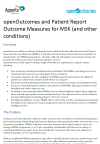OpenOutcomes
Background
Musculoskeletal interventions including physiotherapy, orthotics and surgery always have an impact on patients, hopefully for the better, sometimes for the worse. There is variability in outcomes, which can depend on patient factors but can also depend on the teams delivering care to patients. So that any variability in outcomes in patient groups can be studied and improvements in care made, ‘Outcome Measures’ are collected. These are often patient completed questionnaires to formally score patients’ pain and function before and after interventions including physiotherapy and surgery. Patient Reported Outcome Measures are known as PROMs.
Some healthcare providers and registries now routinely collect questionnaires to compare patients’ pre and post-intervention scores to inform clinical practice and drive improvement (Figure 1). The questionnaires are normally specific to the intervention that has been performed (e.g., hip and knee replacement scores) and most operations or interventions will also have a more general health status score applied (commonly the EuroQol 5 domain general health questionnaire, the “EQ-5D”). EQ-5D can be applied across all aspects of healthcare and is a good way to work out how much impact an intervention or operation may have on health compared to say treatment for diabetes. Other general questionnaires such as the MSK-HQ are being increasingly used in primary care and physiotherapy settings. This helps healthcare providers direct resources to the interventions that have the most patient benefit.
Healthcare organisations currently collect the data mostly in paper format which is then converted into an electronic format for storage and analysis purposes (usually via manual input).
We have chosen to develop a solution that will be open source and based on open standards. It sits either in fully compliant cloud-based servers or within a healthcare organisation’s own environment, meeting all industry standards for security and GDPR. All data collected via the software is held in an open computable format (openEHR) which facilitates data analytics and is designed to interoperate with other healthcare digital systems (Figure 2). Healthcare organisations have full real-time access to their patient data for analysis and other uses (Figure 1), and data is protected as per the NHS governance policies.

Figure 1: The many uses of PROMs using the openOutcomes digital platform.
Solution
There are commercial options available; these can routinely cost each NHS organisation up to £50,000 per year. Instead, we can do this collectively, reduce cost and deliver a best-in-class solution designed by its users. To take the work forward we have created a committee under the governance of The Apperta Foundation, allowing others to get involved and collectively fund the product build. The Apperta Foundation is a clinician-led, “not-for-profit" and is supported by NHS England, NHS Digital and others. We estimate future costs to be £15k 'one off' implementation per trust/hospital and approximately £20-25k per annum. for annual support, hosting, maintenance and membership of the leadership committee deciding future functionality. The more Trusts, Health Boards and organisations that join us, the cheaper it will get. We are happy to work with the independent sector, and overseas organisations
Progress to Date
We have been successful with obtaining funding from NHS Transformation (formerly NHSx) via the MSK Adoption Fund along with funding from the North of England Commissioning Support unit (NECS) to build a best-in-class solution PROMs platform. We have completed the core minimum viable product (MVP) for the openOutcomes platform which can read and pull patient demographics from PAS and allow staff access via Active Directory (using their hospital password). This is being integrated into two NHS Trusts (Northumbria Healthcare and Birmingham and Sandwell) for testing and feedback before offering the platform to further trusts subscribed to the project.
The platform has been designed to be “pathway agnostic” and cover PROMs in any specialty, as well as Patient Reported Experience Measures (PREMs). Common MSK and Orthopaedic outcomes have long been championed and questionnaires have now been written as openEHR archetypes ready to be incorporated into the platform should Trusts require it. These include:
- Foot & Ankle – MOXFQ, AOS, AOFAS, SAFAS, VISA-A, ATRS
- Upper Limb – OSS, OSIS, OES, Boston, PEM, URAM, QDash
- Hip – OHS, iHOT12, NAHS
- Spine – NDI, MDI, ODI, VAS back & leg, VAS arm & neck
- Knee – OKS, OKS (A&P), KOOS, Tegner, IKDC
- General MSK – MSK HQ
- General health– EQ-5D,
- Pain VAS,
- Patient Satisfaction
Current PROMS input methods include:
- Paper, supported by administrator input (currently the best method to get patient engagement with rates around 50%)
- Electronic entry (currently the cheapest method to collect data, but with maximum reach around 25%)
- Tablets or PC web browser entry by the patients in clinic within the hospital’s intranet
- Web and smartphone / tablet entry via the public internet
- The software has automatic prompts when post-operative responses are due and prompts when questionnaires have not been received.
Multilingual support is planned.
openOutcomes has the ability to analyse PROMs data and view charts, graphs, and tables with a variety of queries possible. This allows real time data to be available to clinicians and teams within the NHS organisation using it. Furthermore, OpenOutcomes records data about the procedure itself which can be passed along with the PROMs data into analysis tools with a range of purposes including correlational analysis, creation of visualisations and machine learning.
Shortly we will have the ability to push data into national registries to avoid duplication and save time.
Future aims, should further funds become available and subject to the decisions of the committee, might include:
- The ability for the software to generate bar coded questionnaires so they can be automatically posted out to patients and automatically read when returned and ascribed to the correct patient and operation/intervention.
- Voice generated PROMS scores from robot generated phone calls.
OpenOutcomes is a digital platform capable of building on modules for other speciality PROMs such as ophthalmology, general surgery and cancer services. The technology upon which its built allows for any PROMs questionnaire to be incorporated into the platform due its agnostic capabilities. Figure 2 shows the high level overview of the data technology architecture and how it can interoperate with other digital systems and EPRs within and across NHS organisations.

Figure 2: High level data architecture overview of openOutcomes and how it is interoperable with other IT system across the NHS (Diagram adapted from John Meredith, NHS Wales)
Demonstration Videos
Over to you
We want clinicians, allied healthcare professionals and their departments to get involved in this exciting project by subscribing to use the product and help to shape its future. Subscribers will be asked to take a seat on our committee if they so wish, to govern product development and to decide how future investment should be spent.
Get in Touch
Committee
Our Committee Members
Chair

Professor Mike Reed is a consultant trauma and orthopaedic surgeon for Northumbria Healthcare NHS Foundation Trust. Following medical school in Newcastle and his MD in Sheffield, Mike trained in trauma and orthopaedics in the North of England, and completed fellowships in New Zealand. Currently, he is a full-time hip and knee replacement surgeon, with trauma commitments within a busy Trauma Unit. At Trust level, Mike has run improvement programmes in hip fracture care, infection prevention and enhanced recovery. He is the Clinical Director at Northumbria leading a high performing team, supported by a group of committed and talented colleagues. His research, supported by industry, charity and government funding, focuses on his specialist interest in infection prevention, diagnosis and management, and outcome prediction using large datasets. He is Chief Investigator for clinical trials at the University of York, and is on the executive of the National Joint Registry.
Member & Clinical Lead

Kanthan qualified in medicine from Imperial College London in 2003 and obtained a BSc in Orthopaedic Science from University College London in 2001 whilst an undergraduate. He completed his Orthopaedic training in Birmingham and specialist fellowship training in shoulder and upper limb surgery in Derby & Wrightington. He is a Consultant Orthopaedic Surgeon at Sandwell & West Birmingham Hospitals NHS Trust since 2016 and is the Upper limb and Research lead within the department. He sits on the R&D committee for the trust. Mr Theivendran is an Honorary Professor at the School of Engineering and Applied Science, Biomedical Engineering Research Unit at Aston University and an Honorary Senior Lecturer in Orthopaedic Surgery at Aston Medical School. His interests include Clinical trials, Biomedical Engineering, Health Tech/Health IT and patient reported outcome measures (PROMs).
Member

Anji has worked in healthcare for over 30 years, working for Northumbria Healthcare NHS Foundation Trust since 2004 and has been managing the trust’s extensive in-house elective orthopaedic PROMs programme since 2015. Anji is passionate about PROMs and using the resulting data to improve patient care as well as to inform clinical practice. She is co-ordinator for The National PROMs Network and an Associate member of the UK Faculty of Clinical Informatics. Anji feels that openOutcomes would provide a practical solution to recording and using PROMs and enable ongoing collaborative development to accommodate future requirements.
Member

Ajay Malviya is a Consultant Orthopaedic Surgeon at Northumbria Healthcare NHS Foundation Trust. He trained in the Northern Deanery and has done specialist fellowships in hip preservation and joint replacement surgery in Cambridge, London and Switzerland. He is an expert in hip arthroscopy for femoroacetabular impingement, trochanteric pain syndrome and periacetabular osteotomy for hip dysplasia using a minimally invasive approach. In his routine practice he deals with sports injuries of the hip and has published and presented widely on the results of hip arthroscopy in athletes and general population. He has completed a PhD on the role of hip arthroscopy in femoroacetabular impingement. Preservation of the hip joint is his principle philosophy but he has a wide experience of joint replacement surgery catering to the young population, if necessary. Ajay also serves as a board member for the Non-Arthroplasty Hip Registry and is an advocate of the use of PROMs data to inform clinical practice.
Member

Andrew Bateman has worked in clinical rehabilitation and research since 1990. He completed a PhD in Neuropsychology in 1997 (Birmingham). His Post doc was at University East London until 2002 when he turned to NHS Clinical leadership until 2019. He is now Professor in Rehabilitation at the University of Essex, Director of NIHR Research Design Service East of England, and an Affiliated Lecturer at University of Cambridge. He is a Past President and currently hon. Treasurer of The Society for Research in Rehabilitation; and Chair of the United Kingdom Acquired Brain Injury Forum. His research spans most aspects of rehabilitation with patient reported outcome measurement and metrology as core themes underpinning all of his interests.
Member

Diarmaid is an Advanced Practice Physiotherapist working in North Tyneside, He is co- chair of North East and Cumbria ICB MSK Alliance. He helped develop the North of England Regional Low Back pain programme and now is chair of the National Spine Network and sits on the UK Spinal Societies Board. He is a non-medical member of the Primary Care Rheumatology Musculoskeletal medicine Society and was awarded the John Dickson medal in 2017. He is also a VersusArthritis champion. Originally from Ireland, he graduated with a degree in Physiology and Biochemistry from Cardiff University and then trained to be a Physiotherapist at Leeds University. Based in Northumbria, he worked in Primary and Secondary care Orthopaedics as an ESP, Emergency care practitioner and now works as an Advanced MSK practitioner and non-medical prescriber. He has special interest in narrative medicine, pain science and using a biopsychosocial approach to help people with persistent pain problems.
Member

Roanna qualified as a Physiotherapist from the University of Birmingham in 2002 and started her career at Sandwell and West Birmingham Hospitals NHS Trust (SWBH). Her first rotation was in musculoskeletal outpatients which launched her interest in MSK. Roanna later left the NHS to work for the MOD (RAF) for seven years as an Advanced Physiotherapist treating largely acute injuries and working collaboratively within an occupational health remit. At this point Roanna undertook her MSc in Advancing Practice (Manipulative Physiotherapy) which she completed in 2010 becomming a member of the Musculoskeletal Association of Chartered Physiotherapists (MACP). Having completed her MSc she took up a Consultant Physiotherapist role for Birmingham Community Healthcare NHS Trust. As a clinical leader Roanna developed a strong interest in measuring and demonstrating service efficacy and developing service improvement initiatives. She then made the move back to my roots to take up a Consultant Physiotherapist/MSK Lead post for SWBH NHS Trust in 2014, co-leading a large physiotherapy service and community orthopaedic triage service, alongside part-time work for the University of Birmingham lecturing on manual therapy and sports medicine MSc programmes, and teaching and examining on MACP clinical placements. With her continued interest in patient reported outcome measures (PROMs) research, and evaluation and benchmarking of services she later stepped out of my teaching role to take up a PhD opportunity at Keele University under the guidance of Dr Jonathan Hill entitled; ‘Benchmarking MSK Services’. Rossana is now split between her Consultant role and PhD study which she am due to complete in 2022, with post-doctoral plans to develop a national MSK audit in community and primary care.

